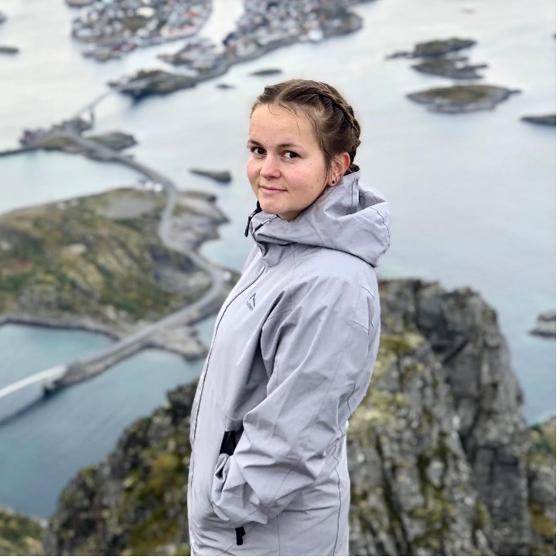Alumni Interview - Nadine Jacques

Quick Presentation
My name is Nadine Jacques, I came from New Zealand in 2016 and started the IFM program in Tromsø, which I finished in 2018.
Can you tell us more about your experience with the IFM program?
I was a part of a great year-group during my time in the IFM program. We were approximately 9 students from all over the world and we each had our own background and motivation for coming to this program. That aspect alone was very valuable and special to me as there was a lot to learn from each other. I was also really inspired by the teachers we had at NFH as it was my first time being so immersed in fisheries specifically. In New Zealand I had studied in marine biology and statistics, so fisheries science was just a small part of my experience there, and all of a sudden, when I started at UiT I had access to knowledge from all realms of this subject. Since my passion was embedded in applied fisheries, I really appreciated the facilitation that was available at the faculty in order for me to do my thesis on data I had collected myself at sea.
So, I partnered with Associate professor Roger Larsen who gave me the opportunity to join a 10-day research cruise to collect my data and I wrote my master thesis on an experiment we ran using a square mesh panel in the North East Atlantic deepwater shrimp fishery. When I graduated I was offered a job at UiT as a research assistant in the research group HARVEST. This was a position I would continue in for the next two years. This was a great chance to get introduced to how it is to work in academia, and I managed to publish an article based on my thesis during this time. I also did a lot of work at sea during that period- collecting data for different projects I was working on.
What was the motivation for choosing this program?
I did my bachelor in marine biology and statistics, and was building on that. My options were to do a Master, or to work as a fisheries observer, which can be a very dangerous job, so I decided to apply for a Master in order to have different opportunities.
What is your professional situation at the moment?
I have recently moved back to Tromsø to start a PhD at UiT after working at Sintef Ocean in Trondheim. The PhD study is on the application of grid systems in the Barents Sea gadoid bottom trawl fishery. This will be a 4-year program.
What is SINTEF and what did you do there?
SINTEF is a research institute, and I was in the fisheries technology group, among the SINTEF Ocean division. There is also SINTEF Energy (oil and gas), IT, and other industries in which SINTEF is doing research. SINTEF is a non-profit organisation, so everything is funded back into the organisation. We have a great working environment here with a lot of care for the employees. They also have a lot of collaboration around the world with other researchers from all kinds of research institutes. There are many different projects running there simultaneously, for example I was involved in some work involving biodegradable plastics as a fishing gear material, as well as mesopelagic fishery research.
It is quite different working there compared to the university. SINTEF is owned privately, so as well as working on research, your time is also divided into meeting deadlines related to research projects you're working in and writing research proposals to different funding agencies, such as the Research Council of Norway. If you don’t have your research funded, then you are not able to do your research, basically speaking. So that adds more pressure as you must make sure you are able to have money coming in to fund your work.
Looking back on your masters studies, what would you do differently? What advice can you give to the IFM students today?
Perhaps to study more. Also, to keep an open mind towards the different courses you are expected to take. I find that some students are a bit hesitant about the program in the beginning perhaps, I know I was. There are going to be topics that may not be especially interesting to you at first, but the field of fisheries management is so broad that it is important to try to have a grasp on all fields of fisheries management; social, biological, political, analytical etc. All of the courses that I took I have found to be important and relevant to various work I have been involved with since finishing the program.
Also, as an international student, sometimes it can be very difficult to understand a new city and university fast enough. The IFM Club was a huge advantage in that way, so I can really recommend that students stay involved with that, to get as many activities organised as they can, and to try to benefit from them. Stay active and talk to people, never be afraid to ask questions if you are unsure. But for me specifically the statistics was really important, so I would really recommend if you want to work in applied fisheries to build a good foundation in statistics.
Thanks a lot to Nadine, and see you around the campus!